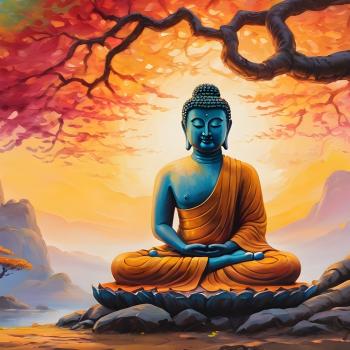Zen is not concerned with prescription or speculation. I wrote about Zen here and here and here. In these posts, I outlined Buddhist thought in broad strokes. Buddhism aims to reduce suffering, and it is mostly concerned with practice, not belief. There is no Buddhist creed, like there is no Hindu or Jewish or Muslim creed.
More important, Buddhist thought expresses the observations of Buddha and his followers. These observations can be verified with objective evidence and subjective experience. Fundamentally, Buddhism is grounded in observation, not speculation. This post will focus on Zen practice, specifically meditation and koan study.
Ask a Zen master several questions: “Is there a God? What is the meaning of life? Where will we go when we die?” He or she might answer: “Who knows? Do you realize your connection to everyone and everything? Are you here now?” Buddhism generally does not confirm or deny these beliefs. Rather, it does not address them, because they are speculative.
The Buddha did not think that it was helpful to speculate about God or the afterlife. Some Buddhists believe in God, some do not, and some believe in an Ultimate Reality that is not personal. Some Buddhists believe that we reincarnate, some do not, and some believe that we merge into Ultimate Reality, without retaining egoic self or individual personality.

Zen Practice: Meditation
In my Zen practice, my teacher generally outlines the Buddha’s teachings. He refers to some sutras, such as the Heart Sutra, which illustrate some of the principles of the Buddha’s teachings. Primarily, our conversations revolve around practice. “How is your practice? Do you realize your interdependence? Does this realization inform your everyday life?”
Zen practitioners believe that kensho is one of the fruits of Zen. Kensho refers to an initial insight or a sudden awakening to one’s true nature. In Zen, true self is “no-self.” There is no separation. Everything is dependent on other things, and nothing is independent.
Zen master Dogen describes kensho as “dropping off” the body and mind. As such, it is a realization of something that is already here, not an attainment of something that is created or developed.
The distractions of daily life might prevent us from realizing our true nature. Thus, Zen focuses on mediation and (sometimes) koan study to remove the distractions of daily life. In Zen, meditation involves becoming aware of what is happening in the the present moment, without become attached to ideas and images.
Chinese master Sheng Yen said, “As the mind becomes clearer, it becomes more empty and calm, and as it becomes more empty and calm, it grows clearer.”
Zen Practice: Koan Study
“What is the sound of one hand?” is a popular Zen koan. For many of us, our first inclination is to intellectually dissemble the koan. We might snap our fingers or flip our fingers into our palms. In a funny Saturday Night Live sketch, a Zen student slaps the Zen teacher across the face. What is the sound of one hand? Zen is not concerned with prescription or speculation.
The koan is supposed to provoke an intuitive response, rather than an intellectual response. Again, the practice is about observation, not speculation. Do not solve the koan. Let the koan solve you. Sit with it in a state of awareness, without becoming attached to ideas and images. Eventually, in minutes or months, the obvious answer becomes embarrassingly clear.
When I begin thinking about a koan, my Zen teacher will shout, “Say it, don’t think about it!!” or more often, “Show me, don’t tell me!!” Seeing my blank stare, he might dismiss me, “Sit with it.” Sure, I’ll think about it. “No, sit with it!! Don’t think about it!!”
The Zen literature is full of stories where a chirping bird or a harsh admonition or a sudden shift will prompt the student to report a kensho experience or to solve a koan. The koans seem strange, paradoxical, maybe even nonsensical. However, we quickly realize that we need to escape our ordinary thought patterns, if we want to realize out-of-the-ordinary insight.
There are hundreds of such koans, and Zen students might take many years to study all of them. Koan study trains the student in the Zen way of thinking, which is experiential, not intellectual, and intuitive, not logical. Koan study does NOT train the student in Buddhist doctrine.
Paradox
Zen is known for its paradoxes. A famous Zen story says, “If you meet the Buddha on the road, kill him!” Nonsense? No, the story is prompting us to dispense with our thoughts about the Buddha. It might be necessary to abandon our untested assumptions, opinions, and understandings about the Buddha to really understand the Buddha’s teachings.
A Zen monk wrote a book titled There Is No God, and He Is Always with You. Nonsense? No, the title is prompting us to dispense with our thoughts about God. It might be necessary to abandon our untested assumptions, opinions, and understandings about God to really understand the nature of Ultimate Reality.
A popular koan says, “When the man crosses the bridge, the bridge flows and the water stands still.” We probably never thought of things that way. What is moving? What is standing still? Actually, everything is happening organically, integrated, interconnected and interdependent. We are participants, not observers, in the experience.
Some traditions emphasize belief over experience, doctrine over practice, and speculation over observation. They do not teach us to challenge our assumptions or to see things as they really are. Through meditation and koan study, Zen teaches us to intuit, to observe, to realize, to see things as they really are, without becoming attached to beliefs or burdened by assumptions.
Zen is not concerned with prescription or speculation. Buddhism is mostly concerned with practice, not belief.
If you want to stay up to date on the latest from You Might Be Right, simply subscribe with your email.
The Way is a Silver winner in the 2024 Nautilus Book Awards in the Religion/Spirituality of Other Traditions category.













